

A publication of The Graduate School, University of North Carolina at Chapel Hill
On-Line Version Spring 2003
Home | Back issues | About us | The Graduate School | UNC-Chapel Hill | Make a gift
Mixing Molecules With Mentoring
Susan Lord finds good results from interdisciplinary innovation
 |
| Photo by Will Owens |
A
decade ago, Susan Lord received a letter in the mail and a little serendipity.
The letter invited interested faculty in the Curriculum in Genetics and
Molecular Biology to apply for its directorship. At the time, Lord was
an associate professor and molecular geneticist in the Department of Pathology.
She was working happily in her laboratory with a few graduate student
researchers on the molecular makeup of blood coagulants.
"I had never had any kind of leadership role in the University," Lord muses. She decided to venture out of the lab and experiment with something new, and the results ultimately transformed her view of graduate education.
Today she is director of the
Curriculum in Genetics and Molecular Biology, professor of pathology and
laboratory medicine, adjunct professor of chemistry and director of the
Royster Society of Fellows. Lord says both the curriculum and the Royster
Society were instrumental in expanding her microscopic view to a macroscopic
one.
"A big problem scientists
have is the very narrow focus on their work," Lord said. The curriculum
provides an interdisciplinary approach, comprising approximately 70 students
and 70 faculty members from 10 departments
in the School of Medicine and College of Arts and Sciences. The Royster
Society includes some of the finest graduate students in disciplines across
the Graduate School.
Lord said she attended the first planning meeting for the Royster Society and was intrigued when she saw students and faculty fit their research into the bigger picture. She immediately got involved as a board member, and became the society's second director in the fall of 2000. The society was initiated in the Graduate School in 1996 and named after its most generous benefactors, Dr. Thomas and Mrs. Caroline Royster, in 1997. Besides funding graduate students, the society was to provide an opportunity for sharing research.
"Research in history and
research in genetics have more in common than you would ever anticipate,"
Lord said.
As director of the Royster
Society, Lord's responsibilities include leading the selection process
for fellows and organizing bimonthly meetings, where fellows working on
dissertations present their research. A student working on an 18th century
artist, for instance, must meet the challenge of describing highly specialized
research to students in other disciplines. Lord also mentors the fellows,
providing advice about graduate school and academic careers.
"Part
of our goal is to prepare these students to become leaders within their
disciplines," Lord said. "We hope that by exposing them to this
environment, they'll have an understanding of the global academic environment."
Lord said the interdisciplinary
interaction in the Royster Society is often serendipitous for students
as well. Students initially see the fellowships as a chance to gain prestige
or funding that gives them more time for research. Later they experience
the benefits of sharing studies from many fields.
"I learned from the Royster
Society how exciting it is bringing people together," Lord said.
"I am prompted by my own experience in the Royster Society to get
scientists to think about other disciplines, and vice versa."
Because these graduate students
are the cream of the crop, Lord wants to reap other benefits from the
Royster Society. As ambassadors for the Graduate School, fellows can assist
in raising money for interdisciplinary fellowships. They conduct research
all over the state, and can help publicize what a research university
does. "Students know people in the community," Lord said.
They also know their research.
Back in her laboratory in Brinkhous-Bullitt Hall, Lord partners with graduate
students in researching a protein that is important to the formation of
blood clots. It's the germ
of medical treatments for cardiovascular disease, and students propel
her research and move the field forward, she said. "It's so important
not to stand still," Lord said. "Everything has to move forward."
- Brandee Hayhurst
© 2003, The Graduate School, The University of
North Carolina at Chapel Hill
All text and images are property of The Graduate School
at the University of North Carolina-Chapel Hill. Contact Sandra Hoeflich
at shoeflic@email.unc.edu
to request permission for reproduction.